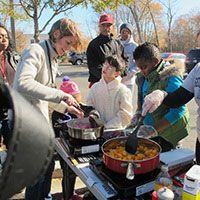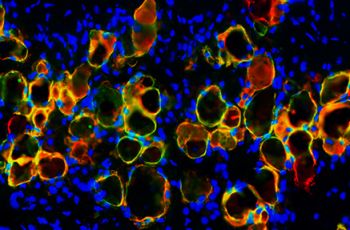Travis Hase, who is in the research track, spent 12 weeks at the White House Office of National Drug Control Policy (ONDCP). He was responsible for gathering information on health policy issues surrounding opioid medications to help the White House educate the public about prescription opioid misuse, overdose, and addiction. The most exciting part for Hase was being able to interact with different public health leaders and to see how health policies that affect both patients and physicians are developed and implemented. “Working at the White House allowed me to blend my passions for healthcare and politics. I saw no better way of taking advantage of living in D.C. and witnessing health policy in action than by working at the White House,” he said. Hase’s work resulted in a paper he is publishing about how physicians can help curb the opioid overdose epidemic through education and responsible prescribing practices.
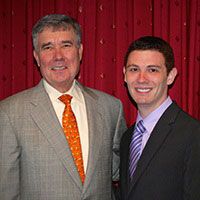
Cristina Romagnoli, a third-year doctor of physical therapy student, spent eight weeks at Emory L. Bennit Memorial Veteran's Nursing Home in Daytona Beach, Fla., where she took on a full caseload, treating patients who suffer from a diverse set of alignments including neuromuscular and cardiopulmonary. She also implemented a quality improvement project called “Walk to Dine,” since many of the residents spent much of their time in wheel chairs even if they had the ability to walk. This involved mapping the grounds and halls to get precise distance measurements. It also involved the screening of all the residents through the course of her rotation to evaluate those able to participate in the program to get more individuals ambulatory. Individuals were flagged as: green, able to walk to and from the dining room; yellow, able to walk one way; or red, able to walk less than 50 ft. The mark was placed on the resident’s identification badge on their wheelchair. “One of the biggest things I have learned from working in a long-term skilled nursing facility is the importance of observation and listening,” she said “It is easy to forget that when you knock on your patient’s door for a visit you are entering their home. From the pictures they choose to put on the wall to quilt on their bed, each little detail is a story about who this person is.”
Cathleen Kenary spent three weeks in Beirut, Lebanon shadowing Fouad Trad, M.D., a physician in the obstetrics and gynecology department at Trad Hospital. Each day was an adventure for Kenary, who spent time in both the delivery and operating rooms at Trad Hospital, which was founded by the Trad family in 1940. “I learned so much not only about the technical aspects of medicine, but about the kind of physician I want to be—the types of relationships I want to have with my patients and the reputation I want to carry within my community,” she said. Kenary was the only student who participated in this program—“I benefited from the individual attention and direction I received from Dr. Trad.” The most exciting part of Kenary’s project was living in the Middle East, an area of the world consumed by religious and political conflict. “One of the main reasons I chose to participate in a summer project at Trad Hospital was because of the location. As a history major, Kenary was very interested in the Middle East conflict. “It is something that I had never fully understood. I reasoned that the best way to figure it out would be to travel to the Middle East and ask questions. Lucky for me, I was also able to practice medicine.”
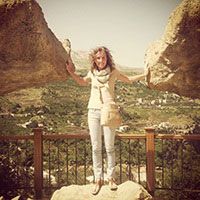
Peter Tooley, a third-year doctor of physical therapy student, spent eight weeks at Tufts Medical Center Outpatient Rehab Clinic in Boston, Mass., working with patients who spoke little or no English. “I had to make sure I became more culturally competent, learn how to utilize interpreter systems, and figure out effective ways to communicate with my non-English speaking patients,” he said. By the end of his internship, Tooley was carrying a partial to full patient caseload and putting to practice the skills and knowledge he learned over the two years in the classroom. The experience kept Tooley on his toes—“It taught me how to really examine the whole patient, rather than just the impairment. The most exciting part for Tooley was getting to work in downtown Boston and serve patients of all different cultures and backgrounds. “I was even able to learn some Cantonese and Mandarin while I was there,” he said.
Yasemin Cagil, who is in the global health track, spent eight weeks at Srinagarind Hospital in Khon Kaen, Thailand. Her time was spent rotating between the pediatrics and obstetrics and gynecology departments. Cagil was tasked with identifying the most common pediatric illnesses in the Northeast region of Thailand, assessing the status of maternal health, mortality and morbidity, and gaining a better understanding of Thai culture and values. The most exciting part for Cagil was getting to observe her first virginal birth and cesarean section “It was an amazing experience to hold a newborn in my arms, as well as travel across the country and meet so many interesting people,” she said.
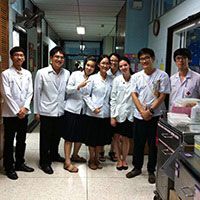
Katherine Dunne, who is in the emergency management track, spent eight weeks at the University of Kansas School of Medicine, collecting patient records pertaining to tularemia, an infection common in wild rodents that is passed to humans through contact with infected animal tissues or by ticks, biting flies, and mosquitoes. Her project consisted of a retrospective analysis of all cases of human tularemia in western, central and southeastern Kansas over the last 30 years. Because tularemia has nonspecific manifestations and is also a potential bioterrorist threat, it is an emergency management imperative to distinguish naturally occurring cases from those caused by a terrorist event. “My goal was to learn how to distinguish between naturally occurring incidence of tularemia and cases caused by bioterrorism,” she said.
Ruqayyah Abdul-Karim, who is in the health policy track, interned for the Presidential Commission for the Study of Bioethical Issues, where she developed an understanding of how scientific research is translated and applied to health policy. She assisted Commission staff in performing archival and literature-based research, as well as policy analysis on incidental findings. “Working at the Presidential Commission provided me with a unique opportunity to work with professionals spanning the fields of law, philosophy, and public health on important health policy issues,” Abdul-Karim said. “It underscored the need for a physician's perspective in the course of developing policies and recommendations that will have an impact on bioethics and the field of medicine as a whole.”
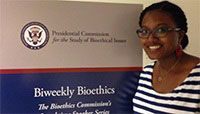
Ann Kennelly participated in a summer research opportunity with the Sabin Vaccine Institute in Belo Horizonte, Brazil. She assisted in a clinical vaccine trial investigating the effects of vaccines in response to hookworms. “In the village of Americaninhas I learned a great deal about hookworm and I saw firsthand the devastating effects that hookworm and other illnesses have on a population with minimal medical care,” said Kennelly. “In Brumadinho I learned about Dengue fever and experienced a new face of medicine in which the government workers traveled from home to home in search of environments that may produce mosquitos with Dengue,” she said.
Zach Spoehr-Labutta, who is in the community health track, worked with the Department of General Pediatrics and Community Health at Children's National Medical Center in Washington, D.C. on a project entitled “Social Network Influences on Normative Values Related to Parental HPV Vaccine Refusal.” The goal of the project was to better understand barriers to vaccine acceptance so that efforts at mitigating vaccine refusal can be appropriately focused for the Washington, D.C. community. “Everybody has a narrative of their life and reasons for making decisions that are vastly more complex than our ability to measure them,” said Spoehr-Labutta. “I learned how to record those stories and work to meld them into a coherent whole upon which community-level solutions are now able to be forged,” he said.
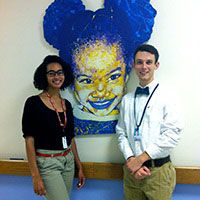
Alice Jisoo Lee, who is in the health policy track, worked with the Medical Education Partnership Initiative (MEPI) on a project entitled “A Medical School Without Faculty: A Survey of Available Resources and Template for Development.” The project aimed to evaluate e-learning in African medical schools and to determine how its utilization can enhance medical education in countries with limited resources and faculties. Lee was involved in cataloging e-learning resources to create an entire medical school curriculum. “It was a very rewarding summer experience and an honor to work for the fellow future generation of physicians in the world, and also a very humbling experience that made me appreciate the easy access to the resourceful environment that is provided for me to become a physician in the United States,” Lee said.
Jacqueline Phillips, who is in the global health track, spent the summer living in the Ecuadorian Amazon with the indigenous Shuar community. She worked with Child Family Health International’s Amazon Community and Indigenous Health Program to research the role of homeopathic versus allopathic medicine throughout urban, rural, and indigenous populations. “The most rewarding part of my experience was living with an isolated Shuar community and getting to learn about their history and traditions while being immersed in their culture,” Phillips said.
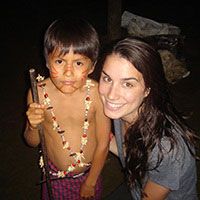
Katharine Meyer, who is in the medical humanities track, worked with the Children’s National Obesity Institute at Children’s National Medical Center in Washington, D.C. to investigate innovative methods for fighting childhood obesity. Meyer worked on a study that assessed the social media use of teens who attend pediatric weight management programs. “This experience provided me with the opportunity to learn about the lack of knowledge around good nutrition and physical activity that is contributing to the obesity epidemic in D.C. and the greater metropolitan area,” Meyer said. “I learned that it's not just about the science behind achieving a healthy weight, but rather it's a matter of community and familial education and involvement to achieve the greatest success.”
Madden Rowell, who is in the medical humanities track, worked with the GW HEALing Clinic and Bread for the City (BFTC) to design and implement a bilingual nutrition and healthy lifestyle intervention tailored specifically towards the Latino community served by BFTC. “This was an amazing experience that I consider to be an invaluable part of my medical training,” Rowell said. “Speaking with patients about their health goals and the challenges they face in meeting them helped me understand the complexity of behavior change and the barriers many people face when trying to improve their health. I especially loved working at the Ward 8 farmer’s market, because I found it very rewarding to show someone how to make a healthy dish and then see them purchase the fresh vegetables and head home with recipe in hand,” she said.
